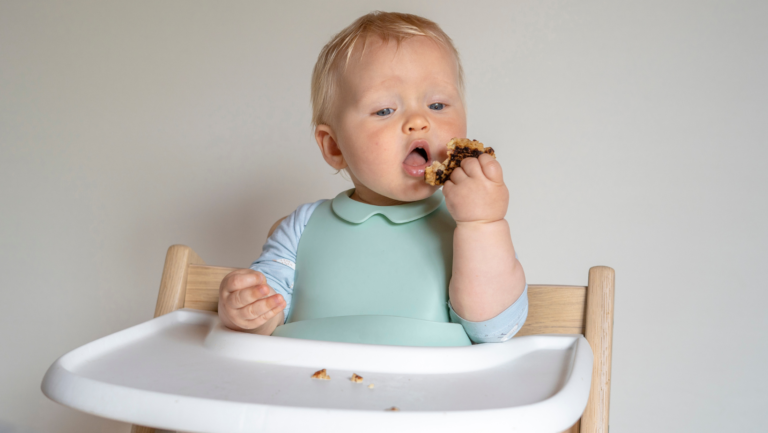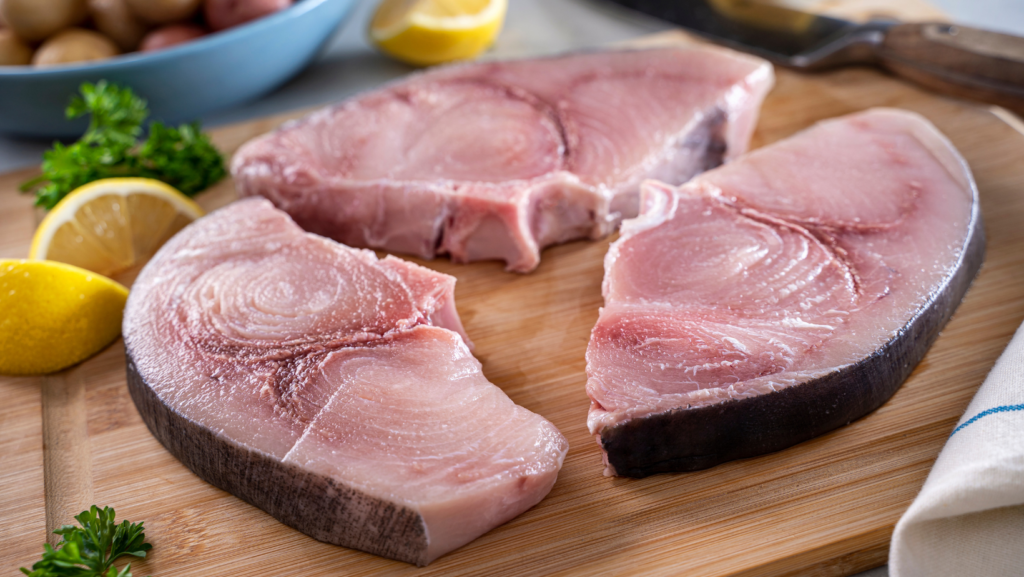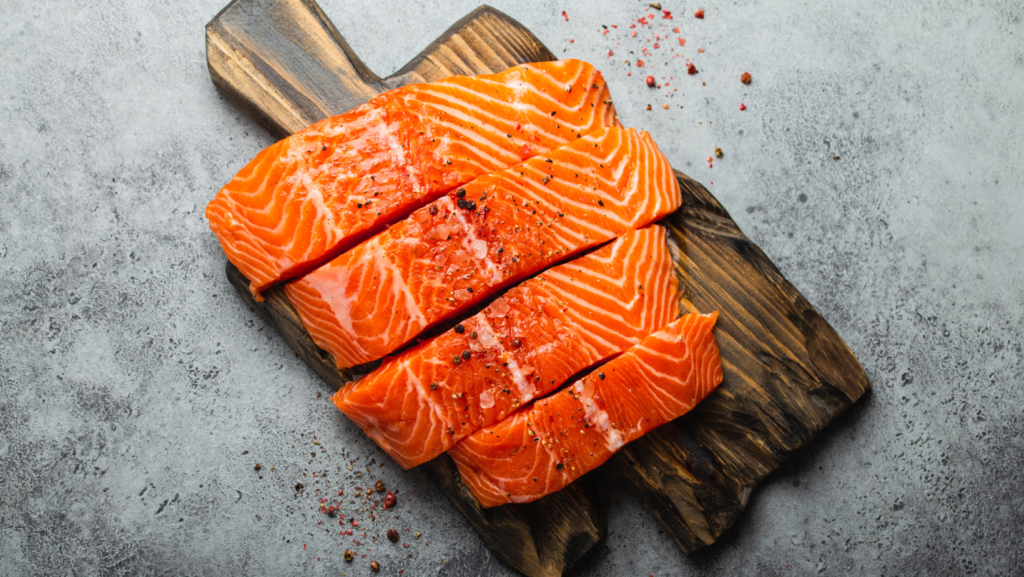Best and Worst Fish Options for Baby

Some of the links below are affiliate links. At no additional cost to you, I will earn a commission if you click through and make a purchase.
Benefits of Fish for Babies
Fish is nutritious and a great protein source for your baby. In addition to high-quality protein, vitamins, and minerals, fish is also a great source of healthy omega-3 fatty acids such as docosahexaenoic acid (DHA), which are essential for a child’s developing brain, nervous system, and vision.
The U.S. Food and Drug Administration state “Fish are part of a healthy eating pattern and provide key nutrients during pregnancy, breastfeeding, and early childhood to support a child’s brain development:
- Omega-3 (called DHA and EPA) and omega-6 fats
- Iron
- Iodine (during pregnancy)
- Choline
Choline also supports development of the baby’s spinal cord. Fish provide iron and zinc to support children’s immune systems. Fish are a source of other nutrients like protein, vitamin B12, vitamin D, and selenium too” (1).
“Docosahexaenoic acid (C22:6 n − 3, DHA) and arachidonic acid (C20:4 n − 6, AA) are the two major long chain polyunsaturated fatty acids (PUFAs) in human milk. In humans, they are fundamental components of the cell membrane and play an important role in neurite growth and signal transmission. Their importance for both preterm and term infants has been demonstrated by various clinical trials. DHA and AA supplementation shows desirable influences on visual and cognitive development in early life and is additionally associated with potential benefits on later health” (2).
Fatty fish such as salmon and trout serve as excellent sources of vitamin D to support your baby’s bones and teeth. (Other foods such as tuna, eggs, liver pate, and vitamin D-fortified products like yogurt and oatmeal are also great vitamin D sources to offer as infant friendly meals.)
There’s also some research suggesting that consuming fish early in life may help prevent allergic diseases such as asthma and eczema (3).
Avoid High Mercury Fish

The one disclaimer that should be made about consuming fish is the possibility of fish being contaminated with mercury.
Most experts agree that the benefits of eating safer fish outweigh the potential risks. Mercury in high doses in infancy can contribute to neurodevelopmental issues so being mindful and choosing low mercury-containing fish is recommended.
It is best to avoid fish that are more likely to be high in mercury. Choices to avoid include:
- Tilefish
- Swordfish
- Orange roughy

Low Mercury Fish Options For Baby
Thinking about the mercury content of fish can be worrisome, but there are actually a lot of low-mercury fish. Some low-mercury options include:
- Salmon
- Sardines
- Trout
- Tuna
- Cod
- Tilapia
- Flounder
The recommended seafood intake for babies is small 1 ounce servings of a variety of low mercury fish and shellfish, 1 to 2 times per week.
- Salmon
Salmon is a low mercury, super nutrient-dense finned fish option and can be served 1-2 times per week for infants starting solid. I love adding seafood into my little one’s diet to ensure they are getting plenty of vitamin D and healthy fats like DHA, and salmon is definitely one of them.
- Sardines
Hear me out before you say “ew, sardines!” Sardines are a powerhouse food for babies due to their omega-3 fatty acid, DHA, iron, and zinc content. They also contain protein, calcium, vitamin B, and vitamin D. They are one of my favorite foods to recommend because they contain the majority of all the critical nutrients our little ones need when starting solids.
They are also one of the lowest mercury-containing fish meaning they are a safer seafood option! Sardines are fish so monitor for allergies when introducing them. Try to purchase no added salt versions for a lower sodium content. Some great ways to serve sardines are preloading on a spoon and allowing your baby to self-feed, or apply it on toast as a topping.
Recommended Fish Brands
I recommend Wild Planet Foods and Safe Catch for low in mercury, canned fish that has no added salt options!
Fish: A Top 9 Allergen
Did you know that finned fish and shellfish are considered two different top allergens? Finned fish refers to fish such as salmon, cod, and sardines, while shrimp, crab, and lobsters are considered shellfish.
That means if your child is allergic to shellfish that doesn’t necessarily mean they will be allergic to finned fish. The two types of fish are biologically different. Both types are recommended to be provided early and often, when your child is meeting all signs of developmental readiness for starting solids around six months.
Fish is considered one of the top 9 allergens. For details on how to introduce allergen-containing foods, so refer back to my top 9 allergen post!
Note: Bones in fish can be a choking hazard. Make sure you’re carefully looking out for bones when offering fish to your baby!
Citations:
1. Center for Food Safety and Applied Nutrition. (2022). Advice about Eating Fish: For Those Who Might Become or Are Pregnant or Breastfeeding and Children Ages 1-11 Years. U.S. Food and Drug Administration. Available at: https://www.fda.gov/food/consumers/advice-about-eating-fish
2. Tai, E.K., Wang, X.B. and Chen, Z.-Y. (2013). An update on adding docosahexaenoic acid (DHA) and arachidonic acid (AA) to baby formula. Food & Function, 4(12), p. 1767. Available at: https://doi.org/10.1039/c3fo60298b.
3. Papamichael, M. M., Shrestha, S. K., Itsiopoulos, C., & Erbas, B. (2018). The role of fish intake on asthma in children: A meta-analysis of observational studies. Pediatric allergy and immunology: official publication of the European Society of Pediatric Allergy and Immunology, 29(4), 350–360. Available at: https://doi.org/10.1111/pai.12889

Cinthia Scott is a Registered Dietitian (RD) and International Board Certified Lactation Consultant (IBCLC) with over 10 years experience in the field of dietetics. Cinthia focuses on ensuring optimal nutrition in the first 1000 days of life to ensure optimal growth and development as well as set the stage for long-term health. Cindy is an author, starting solids expert, and advocate for caregivers receiving evidence based education and support surrounding breastfeeding and starting solids.
Cinthia is co-author of the 101beforeone Starting Solids Book, “101beforeone -baby-led feeding cookbook,” and is the founder and owner of The Baby Dietitian LLC which is her private practice built to provide virtual 1:1 services for caregivers surrounding infant nutrition, toddler nutrition, and breastfeeding support. Cinthia is also the creator of the Starting Solids 101 Program which provides caregivers 1:1 support from a Pediatric Dietitian on how to provide optimal nutrition from the start and create healthy eating habits that will last their whole lifetime. To work with Cinthia, you can access her services here.
Cinthia provides tons of free information for parents on her social media accounts as well.
- Instagram: @The.Baby.Dietitian
- Tiktok: @The.Baby.Dietitian
